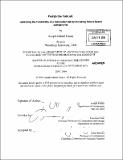| dc.contributor.advisor | Lawrence Sass. | en_US |
| dc.contributor.author | Nunez, Joseph Gabriel | en_US |
| dc.contributor.other | Massachusetts Institute of Technology. Dept. of Architecture. | en_US |
| dc.date.accessioned | 2010-10-12T18:22:52Z | |
| dc.date.available | 2010-10-12T18:22:52Z | |
| dc.date.copyright | 2010 | en_US |
| dc.date.issued | 2010 | en_US |
| dc.identifier.uri | http://hdl.handle.net/1721.1/59201 | |
| dc.description | Thesis (S.M.)--Massachusetts Institute of Technology, Dept. of Architecture, 2010. | en_US |
| dc.description | Includes bibliographical references (p. 60-62). | en_US |
| dc.description.abstract | This thesis is about defining a fixture-based system that can be adapted into a digital fabrication production system of friction fit assembly. It is inspired by the work and research conducted by the Digital Design Fabrication Group at MIT, specifically the work related to the Cabin House and the Instant House. The building industry in recent decades has experienced a fluctuation of different delivery methods; within that variation has been prefabricated construction. Numerous examples, academic and professional, have demonstrated the benefits of prefabrication construction and as result this delivery method has gradually become more attractive to those considering alternative building types. I am interested in proposing a fixture-based system that would assist in electrical components, storage, and lightings and openings in order to improve the usability and flexibility of FabLab that is deployed as friction fit build. Modular systems of architecture have to a large extent remained in the combination of mono-material assemblies; therefore, this thesis asks the question, can mono-material assemblies be flexible enough to include other kinds of fixtures that support the addition of such amenities as electrical appliances, lighting, storage, and expandability? | en_US |
| dc.description.statementofresponsibility | by Joseph Gabriel Nunez. | en_US |
| dc.format.extent | 62 p. | en_US |
| dc.language.iso | eng | en_US |
| dc.publisher | Massachusetts Institute of Technology | en_US |
| dc.rights | M.I.T. theses are protected by
copyright. They may be viewed from this source for any purpose, but
reproduction or distribution in any format is prohibited without written
permission. See provided URL for inquiries about permission. | en_US |
| dc.rights.uri | http://dspace.mit.edu/handle/1721.1/7582 | en_US |
| dc.subject | Architecture. | en_US |
| dc.title | Prefab the FabLab : rethinking the habitability of a fabrication lab by including fixture-based components | en_US |
| dc.title.alternative | Rethinking the habitability of a fabrication lab by including fixture-based components | en_US |
| dc.type | Thesis | en_US |
| dc.description.degree | S.M. | en_US |
| dc.contributor.department | Massachusetts Institute of Technology. Department of Architecture | |
| dc.identifier.oclc | 665860736 | en_US |
